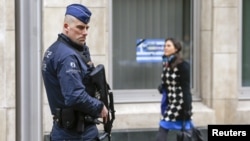Diplomats and law enforcement officials say European security agencies are sharing more information and intelligence — and doing it more quickly — thanks in part to help from the United States.
Belgium has come under intense criticism for not doing enough to prevent last week’s bombings by Islamic State (IS) terrorists at the Zaventem airport and a metro station that killed more than 30 people and wounded hundreds more. There is a sense that the attack may have been what some counterterror analysts described as a long overdue wakeup call for European security agencies.
“It’s getting better,” a Western diplomat told VOA on condition of anonymity, adding that there is still “a very high level of concern for new terror attacks.”
White House deputy national security adviser Ben Rhodes told reporters in Washington on Thursday that FBI teams were on the ground in Brussels helping with the investigation, and that more cooperation was likely.
“We do believe that Belgium is taking this very seriously,” Rhodes said. “We have had effective coordination in supporting their investigation and trying to disrupt additional plots."
U.S. law enforcement officials say teams in Brussels have, for now, largely focused on helping to examine computers and cellphones connected to the suspects in last week’s attacks.
U.S. Attorney General Loretta Lynch also discussed sharing resources during a meeting Thursday with Belgian Interior Minister Jan Jambon.
But others say the support has gone even further.
Removing obstacles
“There is an increase in sharing with the United States,” a European law enforcement official told VOA. “U.S. agencies are actively supporting us.”
Even before the Brussels attacks, European agencies, including Europol and its newly formed European Counter Terror Center, had been working with the U.S. to help integrate and streamline information sharing, a process that has been hampered by technical and cultural obstacles.
“That’s one of the reasons we have people on-site,” the European law enforcement official said, noting teams have been dispatched to both Brussels and Paris to ensure “quality information is shared.”
NATO, normally focused on external threats such as recent Russian aggression, has also become more active.
“We are sharing more analysis, information and intelligence,” a NATO official said. “We are closely monitoring the security situation and remain in constant contact with the Belgian authorities.”
Still, there is concern even stepped-up security and intelligence efforts will not be enough to prevent additional terror plots.
“You can’t address this problem just with law and war,” said Haras Rafiq, managing director of the London-based Quilliam Foundation. “Many of the people that so far have committed these terrorist attacks have been on the radar at some stage."
“It’s a very difficult task for security services that are under-resourced to monitor people 24 hours a day," he added.











